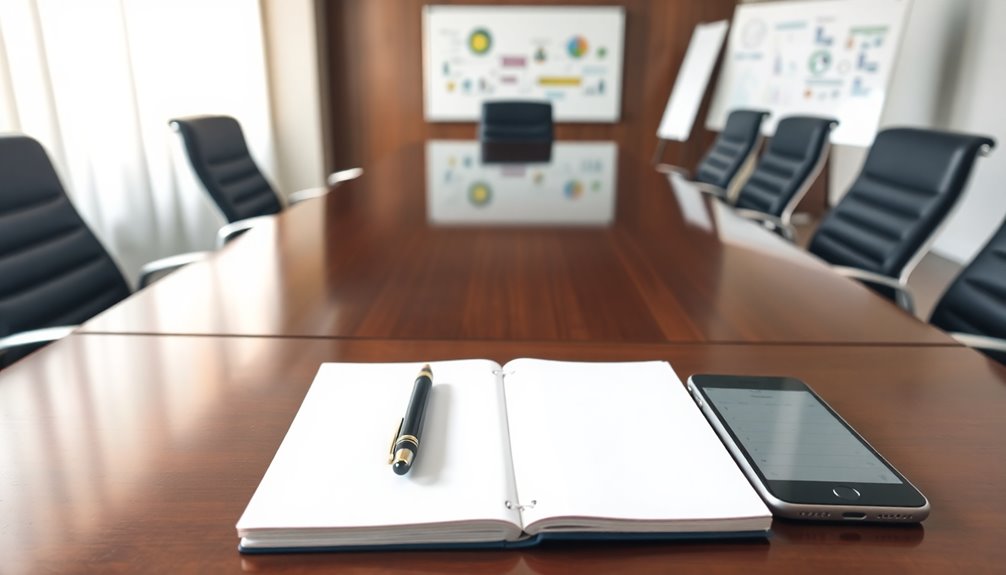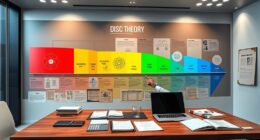Understanding essential finance interview questions is key to your success. You'll face inquiries about your greatest achievements, preferred financial statements, and short-term financing options. Expect to explain how asset purchases affect financial statements and to provide examples of significant financial success. You'll also need to analyze balance sheets, income statements, and cash flow statements. Be prepared to discuss valuation methods like DCF and market capitalization, along with your approach to risk management. By mastering these topics, you'll enhance your confidence and stand out. Keep exploring, and you'll uncover more tips and insights to excel in your finance career.
Key Takeaways
- Prepare to discuss your greatest achievement, highlighting specific skills and determination that contributed to your success.
- Familiarize yourself with financial statements, focusing on their analysis for assessing profitability and liquidity.
- Understand various valuation methods, such as DCF and market capitalization, to confidently address related interview questions.
- Be ready to explain the impact of asset purchases on financial statements and overall financial health.
- Highlight your strategic financial responsibilities, including risk management and compliance, to demonstrate your organizational alignment.
Common Interview Questions

When preparing for a finance interview, you'll likely encounter several common questions that assess your skills and values. One key question may ask about your greatest achievement in your financial career; this helps interviewers gauge your capabilities and determination.
You might also be asked to identify your preferred financial statement for evaluating a company's health, which showcases your analytical preferences. Additionally, expect inquiries about short-term financing options for cash needs, as this illustrates your practical knowledge.
Be ready to explain the impact of an asset purchase on the balance sheet, income statement, and cash flow statement. Finally, have an example of a significant financial achievement ready, quantifying your success to illustrate your effectiveness in the field.
Financial Statements Analysis

Analyzing financial statements is vital for understanding a company's overall health and performance. You should focus on three key statements: the balance sheet, income statement, and cash flow statement. Each provides unique insights into different aspects of business operations.
The balance sheet reveals assets, liabilities, and equity, helping you assess liquidity and solvency. The income statement shows profitability over a specific period, allowing you to gauge operational efficiency. Finally, the cash flow statement illustrates cash inflows and outflows, highlighting how well the company manages its cash.
When you analyze these statements together, you can identify trends, assess risks, and make informed decisions about the company's financial future. Mastering this analysis is an essential skill for any finance professional. Additionally, understanding production quantity variance can provide deeper insights into how operational changes impact financial performance.
Valuation Methods Explained

Understanding financial statements lays a strong foundation for grasping valuation methods. Knowing how to determine a company's worth is essential, especially in finance.
Here are three common valuation methods you should be familiar with:
- Discounted Cash Flow (DCF) – This method estimates the value of an investment based on its expected future cash flows, discounted to present value.
- Market Capitalization – This approach calculates a company's value by multiplying its share price by the total number of outstanding shares.
- Asset-Based Valuation – This method focuses on the company's net asset value, evaluating its total assets minus liabilities.
Mastering these techniques will help you confidently answer valuation-related questions in interviews and make informed financial decisions.
Strategic Financial Responsibilities

Strategic financial responsibilities play a vital role in shaping a company's overall success. You need to guarantee that financial planning aligns with organizational goals, guiding decisions that affect growth and sustainability.
It's important to analyze financial data, forecast future performance, and create budgets that reflect strategic priorities. You'll also want to engage in risk management, identifying potential financial pitfalls and developing strategies to mitigate them.
Compliance with regulatory standards is significant, so you must stay informed about relevant laws and regulations. Moreover, you should cultivate relationships with stakeholders, providing transparency and fostering trust.
Personal Strengths and Weaknesses

Effective financial management goes beyond just fulfilling responsibilities; it also involves recognizing your personal strengths and weaknesses. Understanding these aspects can greatly impact your career trajectory.
Here are three key areas to examine:
- Strengths: Identify your skills, like budgeting or analytical thinking, that contribute to your effectiveness.
- Weaknesses: Acknowledge areas for improvement, such as time management or communication, and create a plan to address them.
- Adaptability: Assess your ability to handle change and how you can leverage that to enhance your role in finance.
Stress Management Techniques

Stress management is essential in the fast-paced world of finance, where tight deadlines and high stakes can take a toll on your well-being.
To effectively manage stress, prioritize your tasks using techniques like the Eisenhower Matrix, which helps you distinguish between what's urgent and important.
Don't underestimate the power of breaks; short pauses can refresh your mind and boost productivity. Incorporate mindfulness practices, such as meditation or deep breathing exercises, to help maintain focus and calm.
Establish a healthy work-life balance by setting boundaries and unplugging after hours.
Ultimately, develop a support network of colleagues and mentors who can provide encouragement and advice during challenging times.
Implementing these techniques can greatly enhance your resilience and performance in the finance industry.
Career Advancement in Finance

- Pursue Continuous Education: Earning certifications or a Master of Finance can greatly enhance your expertise and job prospects.
- Network Actively: Building relationships within the industry can open doors to new opportunities and insights.
- Seek Diverse Experiences: Taking on various roles within finance allows you to develop a broad skill set, making you more adaptable and valuable.
Additionally, consider exploring an IRA investment strategy to better understand how to optimize your financial portfolio for future growth.
Frequently Asked Questions
How Do You Stay Updated on Financial Regulations and Industry Changes?
To stay updated on financial regulations and industry changes, you can subscribe to reputable financial news outlets and industry newsletters.
Attend webinars and conferences to gain insights from experts.
Joining professional associations and networking with peers helps you exchange knowledge and best practices.
You might also consider taking online courses or engaging in continuous education to deepen your understanding and guarantee you're aware of the latest developments in finance.
Describe a Time You Faced an Ethical Dilemma in Finance
When you find yourself in a tight spot, it's essential to navigate carefully.
There was a time when you discovered a colleague manipulating figures to meet targets. You knew it could harm the company's integrity.
Instead of turning a blind eye, you gathered evidence and reported it to management.
Though it was a tough call, you felt it was necessary to uphold ethical standards, ensuring transparency and trust within the team.
What Financial Software Are You Proficient in Using?
When it comes to financial software, you might highlight your proficiency in tools like Excel, QuickBooks, or SAP.
You use Excel for advanced data analysis and financial modeling, while QuickBooks helps you manage accounting tasks efficiently.
If you've worked with SAP, you can mention its role in enterprise resource planning.
Emphasizing your adaptability to learn new software quickly can also demonstrate your readiness to tackle various financial challenges in any organization.
How Do You Prioritize Tasks During Busy Financial Reporting Periods?
During busy financial reporting periods, you prioritize tasks by evaluating deadlines and the impact of each task on your overall objectives.
You break down larger projects into manageable steps, focusing on high-priority items first.
You also communicate with your team to align on responsibilities and guarantee everyone's on the same page.
Explain Your Approach to Risk Management in Financial Decision-Making.
In the world of finance, steering through risk is like sailing through a stormy sea. You assess potential hazards by identifying and quantifying risks before they capsize your decisions.
You prioritize diversification to cushion against unexpected waves, using data-driven insights to steer your strategy. You also regularly review and adjust your approach, ensuring you adapt to ever-changing conditions.
Conclusion
In summary, mastering these essential finance interview questions is like having a golden ticket to the finance career amusement park! With your newfound insights, you'll not only dazzle interviewers but also float through the hiring process like a financial wizard on a cloud of confidence. So, gear up, embrace the challenge, and watch as opportunities rain down like confetti at a parade. You're not just preparing for an interview; you're launching yourself into a thrilling career adventure!
Eugene brings a fresh, dynamic voice to our platform as one of our talented Writers. Specializing in research-driven content, he explores the latest findings in psychology and personal growth, translating them into actionable insights for our readers. Eugene’s work is fueled by a curiosity about what makes us tick and a desire to help others unlock their potential.










